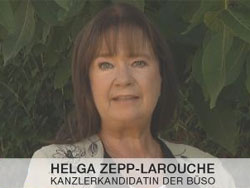Vassals of Europe, Unite: Leave the EU Dictatorship!
| Activities - Comments |
by Helga Zepp-LaRouche
 Oct. 19—Europe is confronting a social explosion, and the euro system is waiting for the Big Bang, one way or another. German Chancellor Angela Merkel and Finance Minister Wolfgang Schäuble are rushing to hand over the very last shred of sovereignty to the Brussels bureaucracy, while, according to the London Guardian, Greek families do not even have enough money to bury their dead—and there are more dead to bury than there were before, because of the life-shortening impact of the austerity policies demanded by the Troika (the European Central Bank, European Commission, and IMF). In Portugal, the veterans' associations have called for a demonstration on Nov. 10, charging that the government's austerity program is unconstitutional and has led Portugal to the abyss, while former President Gen. António Ramalho Eanes fears for the unity of the country. Separatism also threatens to tear Spain apart. On Nov. 14, there will be general strikes in Greece, Spain, and Portugal, and protests across Europe.
Oct. 19—Europe is confronting a social explosion, and the euro system is waiting for the Big Bang, one way or another. German Chancellor Angela Merkel and Finance Minister Wolfgang Schäuble are rushing to hand over the very last shred of sovereignty to the Brussels bureaucracy, while, according to the London Guardian, Greek families do not even have enough money to bury their dead—and there are more dead to bury than there were before, because of the life-shortening impact of the austerity policies demanded by the Troika (the European Central Bank, European Commission, and IMF). In Portugal, the veterans' associations have called for a demonstration on Nov. 10, charging that the government's austerity program is unconstitutional and has led Portugal to the abyss, while former President Gen. António Ramalho Eanes fears for the unity of the country. Separatism also threatens to tear Spain apart. On Nov. 14, there will be general strikes in Greece, Spain, and Portugal, and protests across Europe.
Not since 1945 has there been such a huge gap in Europe between what people in the so-called peripheral countries and a growing number of those in the so-called core countries perceive as life-threatening policies, and the almost somnambulistic apparent self-assurance with which Mrs. Merkel keeps demanding "more Europe"—despite the dire social consequences of this policy. "We must not disappoint the markets," is one of her favorite nostrums; obviously "Europe" and "the markets" have long been synonymous in her mind. And that's where the problem lies.
'System M'
What have we come to, when some 98% of citizens think, "There's nothing we can do anyway," when the Supreme Court rules that Members of Parliament acted unconstitutionally by surrendering national sovereignty to the EU in Brussels without batting an eyelash, or when everyone seems to be accustomed to the fact that the "EU democracy deficit" has become so big that it has replaced democracy altogether? And when even the Frankfurter Allgemeine Zeitung fears that the European Union is in such a furor of self-remodeling, "that one can only hope that all these architects can keep track of what they are doing and not make a new mess of things." At least they admit that there was an "old" mess.
When old wine is sold in new bottles, most people notice it only when they wake up the next morning with a hangover. If old recipes for snake oil are marketed with new packaging, most people fall for it and buy the same brew that had poisoned them once before. And if certain historical processes are repeated, but in a new guise, then the masses of the population, trusting their sense perception, are convinced that what they are seeing are wonderful new clothes. And there are, unfortunately, usually only a very few thoughtful individuals who understand the principles on which these historical processes are based.
Gertrud Höhler, in her book The Godmother: How Angela Merkel Is Remodeling Germany, characterized the Chancellor's political style as "System M." This is a "soft variant of authoritarian display of power," which Germany has not previously experienced in this form, but which, although different in style from the dictatorships of the 20th Century, nevertheless echoes them, with respect to Merkel's "nonchalance in dealing with Parliament, constitutional guarantees, legal norms, and ethical standards." As expected, this book created a huge uproar in the "Europe lobby."
It probably also has something to do with the dramatic escalation of the crisis, that now there is an extremely positive response to an excellent article by Ludwig Poullain [see box] on Oct. 8, in which he called for a clean break with the euro bailout policy and pointed to another parallel to the 1930s. He wrote that when the Nazis were driven from power, he, as a young man, felt that the liberation from censorship, from the prohibition against independent thinking, was the very best achievement of those years.
"Then it took a long time before it dawned on me that elected rulers of a democratic republic also tend to tell their subjects what to think and what not to think, the better to leave such things to the higher-ups."
The culture of debate had died in this country, he continued; real discussions are taboo. Mrs. Merkel and her finance minister just follow the dictates of the markets in order to save the "euro homunculus," and this euro lies like a shroud over Spain, Italy, and France. Mrs. Merkel, with "blind terracotta soldiers" marching behind her—and not just from her own party—will comply with requests for aid until Germany is finished, he wrote.
The external manifestations of the policy today are different, and in this respect, the photo montages in Greece, Portugal, and Spain that have portrayed Merkel in an SS uniform are inappropriate. But people in these countries feel that the consequences of the Troika's policies are life threatening, and even Peer Steinbrück [1] has now figured out that the austerity policies of the Troika are the same as those of Chancellor Brüning [which paved the way for Hitler]. What Steinbrück obviously did not understand, is that there is no solution within this EU system.
A Financial Dictatorship
The parliamentary debate before the EU summit last week once again demonstrated with startling clarity, that it is the blind terracotta soldiers of all parties that have occupied our Parliament. Ultimately, it makes no substantive difference whether a dictatorial Monetary Affairs Commissioner decides how much needs to be cut from the budgets, or whether there is a bank union or eurobonds or a pooling of debt. Nor is it a question of whether saving or spending will resolve the dilemma; the fundamental problem remains the design flaw of the euro; and now that the horse is already out of the barn, all the mandates for the four so-called presidents of the European Union to work out a far-reaching restructuring of the monetary union are completely absurd. Whoever still believes he can force the traumatized and divided peoples of Europe under the yoke of a United States of Europe—in other words, a financial oligarchy—is hallucinating.
Anyone who does not see that all of civilization is about to hit the wall, and that there is an urgent need to change the entire paradigm of politics, is not in living in the real world. Last but not least, the problem of the terracotta soldiers involves the parliamentary system we have in Europe, and naturally, also in Germany. The deputies, who under Article 38 of the German Constitution are supposed to be responsible only to their consciences, instead bow to the party whip, because they want to run for re-election in their districts or keep their places on the slate. "Of course, I am committed to the common good, but not so much that it will cost me my re-election," is their motto. "You've got to be capable of reaching consensus if you want to get ahead politically; that's just how it is with democracy."
The current policy in Europe demonstrates once again how right Thucydides and Plato were, when they discovered 2,500 years ago that dictatorship is the flip side of democracy. When a policy can only be enforced through incessant subterfuge, through systematic deception of the population, and if lack of transparency and obscurantism are required for a government to impose its real intentions, then this is no democracy, and certainly not a republic, but rather a dictatorship. And if that dictatorship can be obtained only at the expense of human life, then this is a new form of fascism.
There Are Alternatives
So we need a new culture of debate in this country, and there are alternatives: to the EU, to Merkel, to the parties now represented in the Bundestag, to the austerity policy, to the bankers' dictatorship, and not least to the risk of escalation of the situation in the Middle East into thermonuclear world war.
We must essentially do what President Franklin Roosevelt did in the 1930s, when he lifted America out of the Depression with a two-tier banking system, the Glass-Steagall system (and not the "ring-fencing" of the Vickers Commission in Britain today); we must also regain the sovereignty of nations over their own monetary and economic policy, terminating the EU treaties from Maastricht to Lisbon, creating a credit system in the tradition of the Kreditanstalt für Wiederaufbau [the Reconstruction Finance Agency] after the Second World War, and launching an economic development program for Southern Europe, the Mediterranean, Africa, and the Middle East—plans that we have elaborated for quite some time.
In the 1930s, before Hitler came to power, there were programs for Germany, similar to the ones that Roosevelt implemented in the U.S., namely the Lautenbach Plan and the jobs creation program of the General German Trade Union Federation. If these programs had been implemented at the time they were proposed, in 1931, then the social conditions could have been eliminated which enabled Hitler to seize power two years later. We would do well to prove that we have learned something from history.
If most people who are thinking, "There's nothing we can do anyway," and who also think that they are vassals or subjects, begin to think for themselves and fight for these alternatives, then we can liberate ourselves from this terrible mental bell jar which currently sits over Germany. And then everything is possible.
It would definitely be better than having Mr. Schäuble become the super-Monetary Affairs Commissioner of his dreams.
Translated from German by Daniel Platt and Susan Welsh
[1] Social Democratic parliamentarian and candidate to oppose Merkel in the 2013 elections; former Finance Minister (2005-09).
https://www.larouchepub.com/eiw/public/2012/2012_40-49/2012-42/pdf/26-28_3942.pdf
| < Prev | Next > |
|---|
| Overstatement from Davos 2017. |
Liberal corporative capitalism, for reasons of lowering traveling costs, proposed not to travel to history alone but packed togather with NATO, EU and unipollar World Order. Workers participation has good chances to step in provisionally, buying time for full scale workers selfmanagment. |









